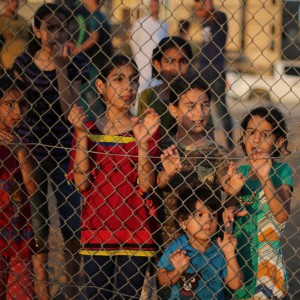Abbas Will Say to the UN, and to Trump: Recognize Palestine. End Our People's Captivity

America routinely offers Israel impunity and rewards. Towards Palestine, it offers only threats. If this White House is serious about peace, it's time to show it.
This Wednesday, Palestinian President Mahmoud Abbas will address the world from the chambers of United Nations General Assembly, an institution founded on the principles of peace, security, equal rights and the self-determination of peoples. The message will be clear: Palestinian rights can no longer be denied, and the captivity and oppression of an entire people under a brutal occupation must end.
As countries meet to deliberate the pressing issues of our time, it is an opportunity for the global body to help remedy the historic injustices it helped create 70 years ago, and take steps that help to promote peace.
With the two-state solution ailing, recognition of the State of Palestine and the delineation of borders for the two states in accordance with international law can help preserve the internationally accepted basis for an Israeli-Palestinian peace agreement.
More importantly, there can be no peace without accountability, and the international community cannot continue to allow Israel to behave with impunity, and expect adherence to the principles of peace by a government that has built its track record on non-compliance and disdain for global norms.
On the sidelines of the UNGA, a follow-up meeting between President Abbas and President Trump will take place to discuss the prospects of peace as the U.S. attempt to formulate a "plan" by the end of this year.
The U.S. has continued procrastinate in developing its vision for peace, yet it has failed to invest in an environment that will be conducive for its achievement.
Just since the last round of meetings, the U.S. failed to hold Israel accountable for building settlements in violation of international law, further carving up Palestinian land and undermining the viability of a Palestinian state. Its ambassador to Israel even used the expression "alleged occupation" of Palestinian land, a complete departure from reality, let alone American policy, and a position more in line with the right-wing, racist elements of the Israeli government.
If the U.S. is serious about peace, any proposal put forward must be grounded in international law and must recognize the Palestinian right to independence and sovereignty on the 1967 borders. It has to address the daily assault on Jerusalem’s character, demography and territorial integrity and formulate a just solution to the Palestinian refugee question.
Any attempt at achieving a resolution cannot be phased or partial, such an approach has failed in the past and with good reason. Another misconception is that the "outside - in", regional approach could work. Normalization of regional ties cannot come at the expense of the Palestinian right to freedom. The Arab Peace Initiative offers a just solution as the only gateway to regional recognition and the establishment of ties, which must follow Israeli withdrawal from all Arab territory it occupied in 1967.
Finally, the political, human and legal rights must be met, and in this context any economic initiative should enhance political progress and not be a substitute for it.
When meeting in the halls of UNGA to discuss the road to a solution, the U.S. should reconsider its standard practice of providing Israel with rewards, inducements and incentives, while using pressure, coercion and blackmail against Palestine.
Should we Palestinians seek to join international organizations or accede to international conventions, we are met with threats. These range from closing the General Delegation of the PLO office in Washington, D.C., withholding aid to Palestine or not issuing the presidential waiver that removes the PLO’s terrorism designation. To take the pressure a step further, U.S. legislation demands that it defunds any international organization that is joined by Palestine.
These threats have become evergreen, are counterproductive and antithetical to peace.
As leaders convene under the banner of the United Nations, it is important to reflect on the spirit, norms and values on which this global institution was built. Each year we meet in September, hoping we can move closer towards ending the occupation, securing Palestinian rights and establishing a just peace. Every year, failure to achieve this objective compounds the culpability and responsibility of the international community and forms a blight on the collective conscience of the world. Let this year be different.